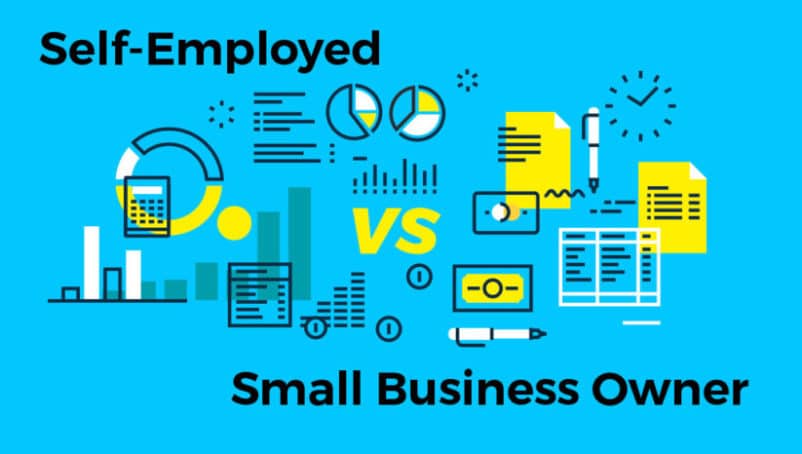Self-Employed vs. Small Business Owner: How your Status Affects your Profit
The difference between self-employed vs. small business owner can significantly affect your business expenses, the personal liability you are exposed to and how you file taxes.
In this article, we will explore the differences between being self-employed and becoming a small business owner.
Continue reading to learn more about the central characteristics and differences, legalities, tax requirements and some pros and cons of each.
How is self-employed defined?
Self-employment means that you are the sole proprietor of the business, a member of a business partnership or an independent contractor.
Sole proprietor
A sole proprietor is a one-person business without a legal entity like a corporation, LLC or partnership. You are the only business owner and are fully responsible for all financials, including any potential debt. A sole proprietorship is typically the easiest business type to start.
Partnership
A partnership is similar to sole proprietors in that there is no legal entity separate from the individuals in the partnership. They are responsible for all financials and are not considered employees for tax purposes.
Independent contractor
An independent contractor works for another person or business, but is not considered an employee. An IC can be registered as any type of business entity, but in practice, most are registered as sole proprietors.
Regardless of how you are self-employed, the primary characteristic is that your business cannot expand beyond your individual capacity.
How is small business ownership defined?
Small business ownership is characterized by having others work for you as either independent contractors or employees.
If you have employees, you oversee their taxes. You are also responsible for having the right workers’ compensation coverage to meet your state’s requirements.
Many businesses may start off as self-employed, especially freelance and consulting types, and as business grows, they expand to become small business owners.
A limited liability company (LLC) is a common structure for small businesses because the members of the business cannot be personally held liable for company debts. It is a hybrid of a corporation (limited liability side) and a sole proprietorship (tax purposes).
Most states allow single-member LLCs, but LLC ownership can also be comprised of individuals in a business partnership.
The advantage of opening an LLC is that owners report their share of losses and profits on their individual tax returns, bypassing corporate filing and double taxation.
One of the most attractive aspects of the LLC is owners have limited personal liability for business debts and obligations.
Taxes for small business and self-employed
Self-employed individuals are responsible for filing a self-employed tax return, which can be paid with quarterly estimated taxes.
They must also pay self-employment tax, which is the Social Security and Medicare tax that is usually withheld from a full-time employee’s paycheck.
Self-employment tax is paid when your net profit (calculated by subtracting your business expenses from your business income) is greater than $400 annually.
Many self-employed workers file quarterly taxes to avoid penalties and a potentially large tax bill at year-end. The IRS form 1040-ES helps to calculate the appropriate payments.
At the end of the tax year, use Schedule C to report your profit and loss. Taxes can be complicated and there are many deductions for being self-employed. Contact a licensed bookkeeper or accountant for guidance.
In a self-employed partnership, taxes are paid by each member of the partnership based directly on his or her income or losses.
Taxes for business owners are somewhat more complicated. For tax purposes, there are different types of businesses, each with its own set of requirements.
The chief benefits of LLC taxation, for example, are that taxes are paid through the personal returns of the owner or owners, and rates may be lower than the rates paid by corporations.
Self-employed vs. business owner: pros and cons
Some of the benefits of being self-employed:
- Independence
- Low startup costs
- Flexible schedule
- Self-employment tax deductions
Some of the drawbacks of being self-employed:
- If you stop working, you stop earning — no paid leave for holidays or sick days
- Debts of the business are the debts of the owner
- Responsibility for invoicing and collecting money
- No minimum wage to fall back on
- No vacation or retirement plan benefits
Pros and cons of being a small business owner
Some of the benefits of being a small business owner:
- Creating a business entity ensures that company can continue to generate revenue even if the individual owner does not work for a period of time
- The business is a separate entity from its owner, meaning different legal obligations and personal financial risks
- The ability to delegate tasks you otherwise would have to do if working alone
Some of the drawbacks of being a small business owner:
- More complex to set up and harder to run
- Despite the benefit of being personally dissociated from certain liability, there is still entrepreneurial risk involved
- Responsible for employee payroll
- Responsible for workers’ compensation benefits for employees
Insurance for small business owners vs. self-employed
Small business owners and self-employed workers can both benefit from business insurance. Lawsuits can cost small businesses anywhere between $3,000 and $150,000, according to the Small Business Administration.
For unincorporated small business owners or contractors whose business gains and losses are tied to personal finances, small business insurance can offer vital protections.
For example, general liability insurance can protect you from costs associated with common accidents that result in an injury or property damage to anyone who is not an employee.
A commercial auto policy is required in every state for business-related driving, and professional liability insurance can provide financial protection if you are accused of making a work mistake that leads to an injury or financial damages.
Workers’ comp insurance is almost always required when you have one or more employees and it provides important benefits for self-employed workers if you opt for business owner’s coverage.
Start a free instant quote with Next Insurance to see how much insurance will cost for your small business or sole proprietorship. It only takes a few minutes to get a quote and review your options.

